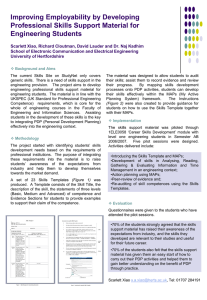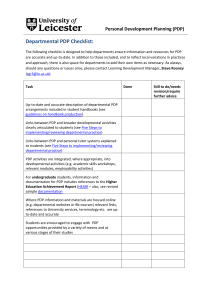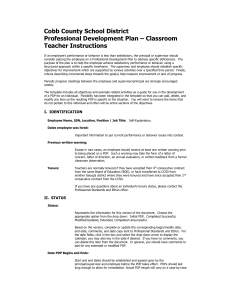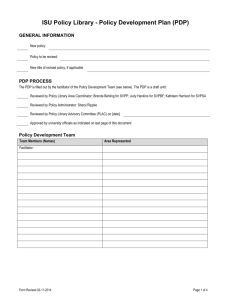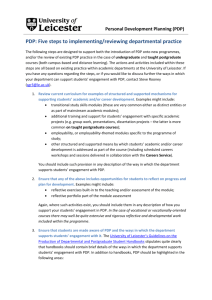Policy and Quality Standards on Supporting Student Personal
advertisement
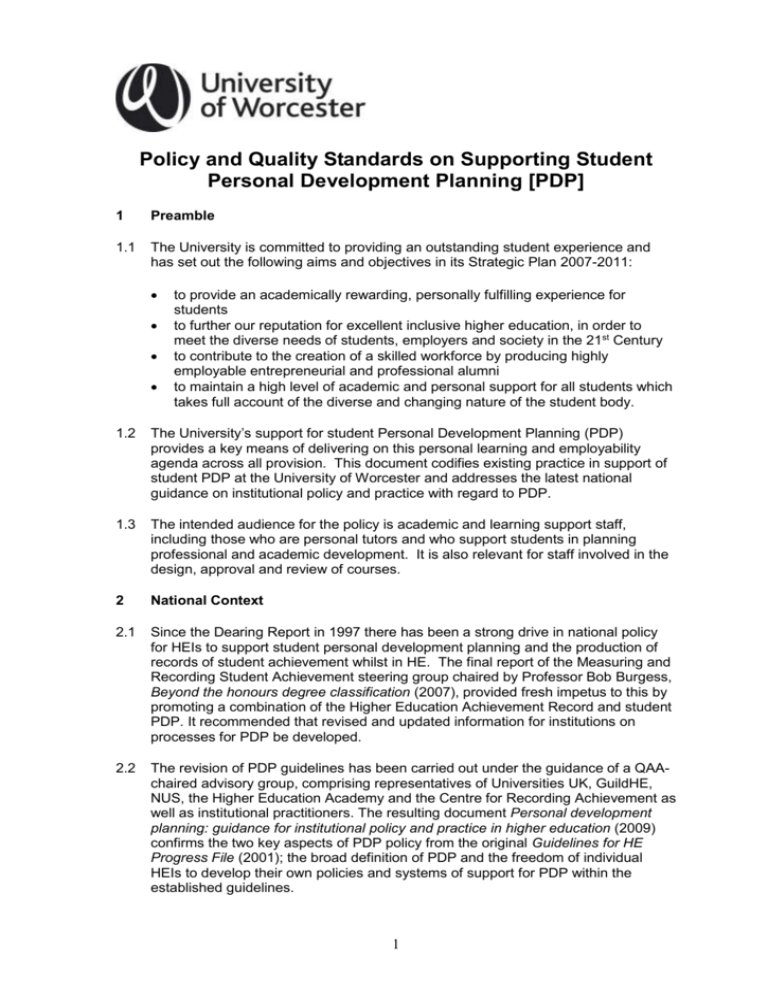
Policy and Quality Standards on Supporting Student Personal Development Planning [PDP] 1 Preamble 1.1 The University is committed to providing an outstanding student experience and has set out the following aims and objectives in its Strategic Plan 2007-2011: to provide an academically rewarding, personally fulfilling experience for students to further our reputation for excellent inclusive higher education, in order to meet the diverse needs of students, employers and society in the 21st Century to contribute to the creation of a skilled workforce by producing highly employable entrepreneurial and professional alumni to maintain a high level of academic and personal support for all students which takes full account of the diverse and changing nature of the student body. 1.2 The University’s support for student Personal Development Planning (PDP) provides a key means of delivering on this personal learning and employability agenda across all provision. This document codifies existing practice in support of student PDP at the University of Worcester and addresses the latest national guidance on institutional policy and practice with regard to PDP. 1.3 The intended audience for the policy is academic and learning support staff, including those who are personal tutors and who support students in planning professional and academic development. It is also relevant for staff involved in the design, approval and review of courses. 2 National Context 2.1 Since the Dearing Report in 1997 there has been a strong drive in national policy for HEIs to support student personal development planning and the production of records of student achievement whilst in HE. The final report of the Measuring and Recording Student Achievement steering group chaired by Professor Bob Burgess, Beyond the honours degree classification (2007), provided fresh impetus to this by promoting a combination of the Higher Education Achievement Record and student PDP. It recommended that revised and updated information for institutions on processes for PDP be developed. 2.2 The revision of PDP guidelines has been carried out under the guidance of a QAAchaired advisory group, comprising representatives of Universities UK, GuildHE, NUS, the Higher Education Academy and the Centre for Recording Achievement as well as institutional practitioners. The resulting document Personal development planning: guidance for institutional policy and practice in higher education (2009) confirms the two key aspects of PDP policy from the original Guidelines for HE Progress File (2001); the broad definition of PDP and the freedom of individual HEIs to develop their own policies and systems of support for PDP within the established guidelines. 1 2.3 PDP is defined as ‘a structured and supported process undertaken by an individual to reflect upon their own learning, performance and / or achievement and to plan for their personal, educational and career development.’ (QAA et al 2009, p. 5) 3 University Policy on Supporting Student PDP 3.1 The University of Worcester has adopted an holistic approach to the implementation of support for student PDP. Rather than seeking to implement PDP through, for example, a discrete award or generic module the University seeks to embed it in the learning process across and beyond the curriculum. It therefore provides support for student engagement in PDP in three areas: 3.1.1 3.1.2 3.1.3 Through the curriculum and programme systems – All programmes at the University, including both taught and research awards are required to support student PDP in line with the University’s Quality Standards for provision of opportunities to engage in PDP. Through the personal tutorial system – The primary role of the personal tutor as defined at Worcester is to support student PDP. Through support for independent student engagement in PDP – Materials and resources are provided direct to students via the student SOLE pages to allow them to plan, reflect on and record their personal, academic and career development. 4 Responsibilities and Guidance 4.1 Responsibilities and Guidance Policy element 1 Implementing support for PDP in the curriculum Relevant documents Quality standards for provision of opportunities to engage in PDP 2 Personal tutor support for PDP University Student Handbooks 3 Supporting independent student PDP PebblePad, Student Qualities Profile. 4.2 Responsibility Programme teams in Institutes for taught provision. The Graduate School for research provision. Personal tutors Information and Learning Services elearning team and the Academic Development and Practice Unit. Guidance and Support ADPU staff guides: An introduction to PDP and Supporting PDP through the curriculum ADPU staff guide: What is the role of the personal tutor? PebblePad introductory guidance and Student Qualities Profile frequently asked questions. Monitoring Curriculum design process, validation and review. Programme annual monitoring. Scheme and university student feedback systems ILS and AQU annual monitoring The Academic Development and Practice Unit provide generic guidance and bespoke workshops for programme teams on supporting student PDP and addressing the Quality Standards. They also provide institutional leadership on 2 researching and evaluating PDP practice to inform the enhancement of institutional practice. 5 5.1 UW PDP Quality Standards The University of Worcester developed and agreed these Quality Standards for provision of opportunities for students to engage in PDP based on the ‘key actions for the effective implementation of PDP’ set out in the sector wide guidelines. Programmes are free to deliver on these quality standards through whatever means they deem most appropriate to their specific setting. The UW standards apply across all our programmes and are expressed in terms of student entitlement, to emphasise the student-centred nature of UW provision. 5.2 Students on all programmes will be provided with: 5.3 6 Advance information on, o The opportunities offered to engage in PDP through their programme of study o Information on the ways in which their own evidence of learning may be eligible for accreditation At the start of their programme, o A rationale for engagement in PDP throughout the programme o An introduction to PDP o An introduction to the opportunities provided by the programme for PDP At each stage of the programme, o A rationale for any development or change in the use of PDP mechanisms as the programme progresses Throughout their programme, o Opportunity to engage in PDP across a range of learning contexts o Accessible support mechanisms for engagement in PDP across the range of learning contexts o Opportunity to build a record of their learning achievements o Opportunity to discuss their PDP with a tutor or advisor On completion of the programme, inclusion of any formal accreditation of engagement in PDP to be included on the transcript or HEAR. These standards to be assured by mapping them against all programme provision. References ADPU staff guide: An introduction to PDP At: http://www.worc.ac.uk/adpu/documents/introduction_to_PDP_at_Worcester_2008(3).doc ADPU staff guide: Supporting PDP through the curriculum At: http://www.worc.ac.uk/adpu/documents/Supporting_PDP_through_the_curriculum_guide_version _3.doc ADPU staff guide: What is the role of the personal tutor? At: http://www.worc.ac.uk/adpu/documents/ADPU_Personal_Tutor_role_guide_Dec_2008.pdf Burgess Group Final Report, Beyond the honours degree classification (2007) At: http://www.universitiesuk.ac.uk/Publications/Pages/Publication-272.aspx QAA et al, Personal development planning: guidance for institutional policy and practice in higher education (2009) At: http://www.qaa.ac.uk/academicinfrastructure/progressFiles/guidelines/PDP/PDPguide.pdf 3 Version reference: 1 Final (replaces document on PDP Quality Standards) Document approved by: Academic Standards and Quality Enhancement Committee via Learning, Teaching and Student Experience Committee, June 2009 Date document comes into effect: September 2009 Author of the document: Deputy Head of Academic Development and Practice Date document is due for review: 2011/12 4 Appendix Key actions for the effective implementation of personal development planning (QAA et al, 2009, p.10-11) The nature and scope of opportunities for PDP and the recording and support strategies adopted are determined by individual institutions. However, the experience of implementing PDP across the UK HE sector has identified a number of key actions for effective practice in support of PDP at institutional, programme and individual learner levels. 1 Institutional strategy and policy Institutions have a strategy and policy framework for the implementation, monitoring and quality enhancement of PDP provision. Such a framework establishes and develops: the nature of institutional opportunities for PDP for all learners at all levels in all types of provision any appropriate institutional recording and support systems the scope for customised practice across programme provision the flexibility of policy requirements when extended to students in partner institutions appropriate staff development opportunities to support PDP implementation how the views of stakeholders (such as students, staff and employers) will inform the continuous enhancement of PDP practice the locus for senior management commitment and support for PDP how PDP provision will be resourced. 2 Presence within programmes PDP has a clear presence and is valued at programme level. This can be achieved when: programmes have an agreed rationale and framework for PDP, made clear in approved documentation and communicated to staff and students through course materials PDP is clearly related to the curriculum and is highly visible, whether delivered as a discrete strand or embedded within subject provision and practice PDP practice is customised and adapted to establish local ownership of the ways in which learner engagement in PDP is supported and valued within a programme. 3 Engaging with learners Learner engagement in PDP is valued and supported throughout the student lifecycle so that learners are encouraged to take ownership of their own PDP practice, processes and records. To this end, learners are provided with: advance information on support for PDP in their programme a rationale for engagement with PDP throughout their programme an introduction to approaches used to support PDP at the different stages of their programme accessible institutional or programme tools and aids supporting engagement in PDP processes and an introduction to, and ongoing support with, their implementation and use opportunities to engage in PDP activities at each stage of the programme and across a range of learning contexts opportunities to integrate extra-curricula experiences into their self-development and to reflect on their own identity, and their personal, lifelong and life-wide learning opportunities to create their own learning records containing information on qualities and skills they can evidence, which can be drawn upon when applying for a job or further study opportunities to give feedback on their experience of PDP provision clear guidance on the eligibility for accreditation of their own evidence of learning through PDP (for example, through accreditation of prior experiential learning (APEL), work experience, or reflective practice) and its recording on an institutionally verified record recognition and development of the learner's engagement in PDP-style processes prior to entry to HE, including associated records. 5
